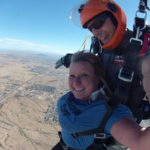Can you Skydive in the Rain

Skydiving is an exhilarating experience that requires optimal conditions to be both safe and enjoyable. A common question that arises is, can you skydive in the rain? While the thrill of freefall is enticing, certain weather conditions, especially rain, can significantly impact the skydiving experience. Here’s a comprehensive look at why waiting for a clear, sunny day is the best option for this adventurous activity.
The Clarity of Vision
Clear skies offer skydivers, especially beginners, the visibility needed to gauge their position in the air and anticipate their landing. The view of the ground from thousands of feet above is not just part of the thrill but is essential for safety. So, can you skydive in the rain and cloudy weather, It makes it challenging to navigate the skies and enjoy the panoramic views that make skydiving a memorable experience. The clarity and serenity that comes with a clear sky enhance the sensory experience, making every dive a unique journey of discovery and exhilaration.
The Sting of Raindrops
Imagine being hit by sharp pellets of rain while soaring through the skies at high speeds. Raindrops, which seem harmless on the ground, transform into stinging projectiles in the air, compromising the skydiving experience. The pain can cause divers to spend most of their time on their back, missing out on the majestic views and the thrill of the freefall. Each drop feels like a needle, piercing through the skin, turning a moment of ecstasy into an ordeal of endurance, robbing the diver of the joy and freedom that defines skydiving.
Dampness and Cold
Skydiving in the rain means getting drenched, and with the wind chill at high altitudes, it can get uncomfortably cold. The focus shifts from the excitement of the dive to the discomfort of wet clothing and the biting cold, detracting from the overall experience. The sensation of the wind, usually a thrilling aspect of the dive, becomes a chilling gust, exacerbating the cold and making the descent a race to the ground, rather than a majestic float amidst the clouds.
Parachute Complications
Rain adds extra weight to the parachute, affecting its performance and the skydiver’s control. The added moisture can cause the parachute to stick to itself, leading to deployment issues. A parachute burdened by rain and wind is a safety hazard that every skydiver should avoid. The precision and reliability of the parachute are compromised, turning a tool of safety into a potential risk. The descent, meant to be a controlled and graceful entry back to earth, becomes unpredictable. So the question remains, Can you skydive in the rain?
Landing Hazards
Landing in the rain is fraught with risks. The ground is slippery, and the added wing load increases the chances of skidding and falling. The obscured vision due to rain can also lead to collisions with obstacles on the ground. The final moments of the dive, meant to be a triumphant and graceful return to solid ground, are marred by uncertainty and danger, as the wet terrain turns every step into a potential slip.
FAA Regulations
Skydiving in the rain violates FAA rules designed to ensure the safety of skydivers, pilots, and others involved in aviation. Visibility is a critical aspect of these regulations, and rain significantly impairs it, increasing the risk of accidents. The guidelines are not just legal requirements but are rooted in ensuring that every dive is a safe and enjoyable experience. In the dance between thrill and safety, these regulations ensure that the scales are always balanced.
The Verdict
So, is it advisable to skydive in the rain? The consensus at Phoenix Skydive Center is a resounding no. The risks and discomforts associated with rainy weather skydiving far outweigh the thrill. Safety and enjoyment are paramount, and clear, sunny skies offer the best conditions for both.
Skydiving is not just about the adrenaline rush; it’s a holistic experience where every element, from the weather to the equipment, plays a pivotal role in creating unforgettable moments. Waiting for the perfect weather ensures that the skydiving experience is not just thrilling but safe, allowing divers to immerse themselves fully in the majestic descent from the skies.
For those eager to experience the thrill of skydiving, patience for the right weather conditions is advised. The skies are always there, waiting to offer an embrace to the thrill-seekers, adventurers, and those looking to conquer their fears. When the sun shines bright, and the skies are clear, that’s the opportune moment to take the leap, soar through the skies, and create memories that will last a lifetime.
For more information on safe skydiving practices and to book your next dive, visit Phoenix Skydive Center. To understand FAA regulations on skydiving in different weather conditions, check here.
